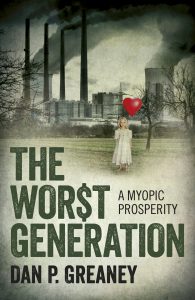
By Dan P. Greaney, author of The Worst Generation, published by Roundfire September 2016
Our forebears recognized that capable political institutions are necessary to secure the benefits of living in a society. As we follow in the American tradition, seeking to sustain a democratic government, we must pursue reasonably equal access to political influence among our citizens. There is no democracy without that equal access.
The right to vote is substantial, but not enough. In a world where money buys advertising that shapes political perception and buys elections at all levels and in all branches of government, wealth must not be concentrated in extremes. Democracy requires an economic system that supports individual political capacity.
Background
We have generally enjoyed a prosperous relationship between our economy and our democracy. Jefferson's concept, in practice, of a government of white male land-owners fit with the prejudices and economy of his day: farming was the pre-eminent occupation, and gentlemen farmers could steer the country. Forty years later Jacksonian democracy extended the vote to nearly all adult white males, and struggles since have at least legally bridged race and gender exclusions. This extension of voting rights served us well in the century following Jackson, for as our economy changed and the industrial revolution created an urban working class, our government was equipped to regulate business, reducing the brutal conditions of child labor, hazardous working conditions, unlimited work hours, and starvation wages. When the Great Depression hit, brought on mainly by failures in the finance and banking industries and ended by extensive government spending through New Deal and WWII efforts, Congress was able to pass finance and banking regulations--notably the Glass-Steagall Act separating investment and commercial banking--that seemed to serve well. In that era, from 1945-1980, the American middle class prospered. In 1976 the bottom 99% in the US economy owned a respectable 80% of our wealth. Corporations could afford to pay living wages and provide health care and pensions. The US standard of living rose steadily.
Today:
Since 1980, conditions have deteriorated. Deregulation and technology have promoted a more cutthroat capitalism that must gather every dime to itself, and the result contributes to lowered wages and loss of health care and pension plans that once blessed our workers. In contrast to 1976, today the bottom 99% in the US economy own only 63% of our wealth. Worse, the bottom 40% own less than 1% of our national wealth. And where has that disappearing prosperity gone? Directly to the wealthiest 1%. If that wealth loss were the result of taxation we would be up in arms. But it is not a tax to a government that should serve us. It is a gift--a bonus, welfare from the middle class given to the very richest in the land. And we call it a gift rather than theft only because that wealthiest 1% have made their actions legal by buying deregulation of the finance industry, and hiding their questionable dealings by artfully defunding the government that should police them. As for the middle class, we are losing homes, jobs, education opportunities, and standard of living.
Democracy cannot survive these conditions. Wealth writes legislation, creates distractions, and buys advertising that develop policies and politicians, including judges, that serve wealth concentrations rather than people. Well-intentioned representatives are brought to heel by moneyed interests because wealth controls the media from which voters learn, and thus wealth controls elections, and so compromises must be made to accomplish anything at all. Lobbyists, with the ugly rationale that if they don't buy legislation then their competitors will, are spending nearly ten million dollars every day chumming up congressional votes and agency policies. Meanwhile, citizens go to the polls with little effect and decreasing hope. They see their economic and political power shrinking, and they lose faith in their government. The sentiment becomes Washington's broke! and Throw the bums out!
But it is not so much Washington that is fundamentally broken. It is the extreme economic conditions that have allowed, even forced through unfettered competition, a wealthy minority to coopt our government.
The Fix:
The problem here is not capitalism. The problem is not wealth. The problem is the extreme inequity in wealth distribution that deprives most of the American electorate from the access to power that a small minority, typically working with corporate dollars, buys. We won't get the dollars out of politics. McCain-Feingold has demonstrated that. We must then get the dollars to more people.
The fix is easily stated: to save democracy we must reduce gross inequities in wealth.
The actions to return us to more equal shares in dollars and government are less easily stated and, frankly, less palatable in this "me-first/country-last" culture that money and greed have established. We could significantly raise taxes on the wealthiest. We could require that no one in a corporation or its contractors be paid less than 10% of the top remuneration in the corporation. We could not effectively limit the lobbying or advertising that money buys. We must, rather, afford even that form of free speech to more of our citizens.
Lincoln wondered whether a nation conceived in liberty and dedicated to the proposition that all men are created equal could long endure. Patriots today must reshape our economy to empower more of our citizenry, or we answer him in the negative.
And then:
If we have the character to bring our economy back into the service of our democracy, then we will have the tools to address the issues that beset thinking, caring, and willful people, rather than having those issues drowned in the tsunami of carefully constructed lies that distort legislative and policy effects, and money-hyped distractions that leave us vacant when it comes to dealing with the widespread issues of our personal and societal well-being.
With a government more broadly beholden to its people, we can address basic questions of tax structure, government solvency, finance-industry regulation, personal economic security, educational opportunity, public and environmental health, and global concerns of war, peace, trade, and environmental stability. We will be more able to build rational policy around the traditional Republican/Democratic balance of personal and social responsibility, rather than sell policy to a wealthy minority. We can, in fact, exercise democracy.
The people of this nation want democracy. We voted for Obama and "Change." Citizens are Occupying Wall Street. A few voices cry in the wilderness, but where is the swell of corporate and political leadership necessary to restore democracy? Where are the legislative leaders boldly designing how we, as Benjamin Franklin put it, can hang together lest we hang separately? Where are today's patriots?
The Worst Generation - A Myopic Prosperity
The Worst Generation is character Jenny Alhouse’s indictment of her parents’ contributions to the contemporary world, their generational short-sighted and selfish degradation of economic and environmental well-being. Her recounting of childhood shows much she is thankful for - a stable, caring home, times kayaking with her father, family trips, a quality education, the benefits of prosperity. But she tells the story from her adulthood, and includes the things she could not see as a child: the economic and environmental plundering and inconsideration imbedded in her upbringing that leave her world unstable, uncivil, and unsafe.
Buy this Paperback: AMAZON US | AMAZON UK | HIVE | INDIEBOUND
Buy this e-book: AMAZON US | AMAZON UK | HIVE | INDIEBOUND
Categories:
0 comments on this article








